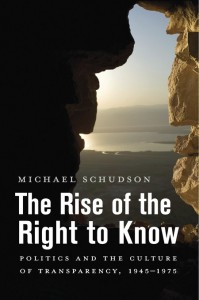Date/Time
Date(s) - 11/18/2015
12:00 pm - 1:30 pm
Hyde Hall, UNC Chapel Hill
 On Wednesday, Nov. 18, the UNC Center for Media Law and Policy will join with the Department of Sociology and the School of Media and Journalism to present a public lecture by Michael Schudson, a Columbia University journalism professor. Schudson will talk about his new book, The Rise of the Right to Know.
On Wednesday, Nov. 18, the UNC Center for Media Law and Policy will join with the Department of Sociology and the School of Media and Journalism to present a public lecture by Michael Schudson, a Columbia University journalism professor. Schudson will talk about his new book, The Rise of the Right to Know.
Schudson is an expert on the history and sociology of American news reporting. He received a M.A. and Ph.D. in sociology from Harvard, and he has received many honors, including a Guggenheim Fellowship and a MacArthur Foundation “genius” award. In 2004, he received the Murray Edelman distinguished career award from the political communication section of the American Political Science Association and the International Communication Association.
Schudson is the author of seven books and co-editor of three others concerning the history and sociology of the American news media, advertising, popular culture, Watergate, and cultural memory. His articles have appeared in the Columbia Journalism Review, Wilson Quarterly, and The American Prospect, and he has published op-eds in The New York Times, The Washington Post, the Los Angeles Times, Newsday, the Financial Times, and The San Diego Union.
In his latest book, The Rise of the Right to Know: The Politics and Culture of Transparency, 1945-1975, Schudson shows how modern transparency dates to the 1950s, 1960s, and 1970s—well before the Internet—as reform-oriented politicians, journalists, watchdog groups, and social movements won new leverage. At the same time, the rapid growth of higher education after 1945, together with its expansive ethos of inquiry and criticism, fostered both insight and oversight as public values. Schudson provides case studies of precedent-setting disclosure practices: the Freedom of Information Act (1966), reforms of supermarket labeling (1970s), sunshine legislation in the Congress (1970), the complicated conceptual and legislative origin of the “environmental impact statement,” and newsroom changes that increased the independence and analytical sophistication of news coverage after 1968. These changes brought a “right to know” into political life and helped define a new era for representative democracy—less focus on parties and elections, more pluralism and more players, year-round monitoring of government, and a blurring line between politics and society, public and private. The rise of openness marks a new stage in self-government.
This event is free and open to the public. Click here for more information.
Tagged: Sociology, Speakers

Comments are closed.